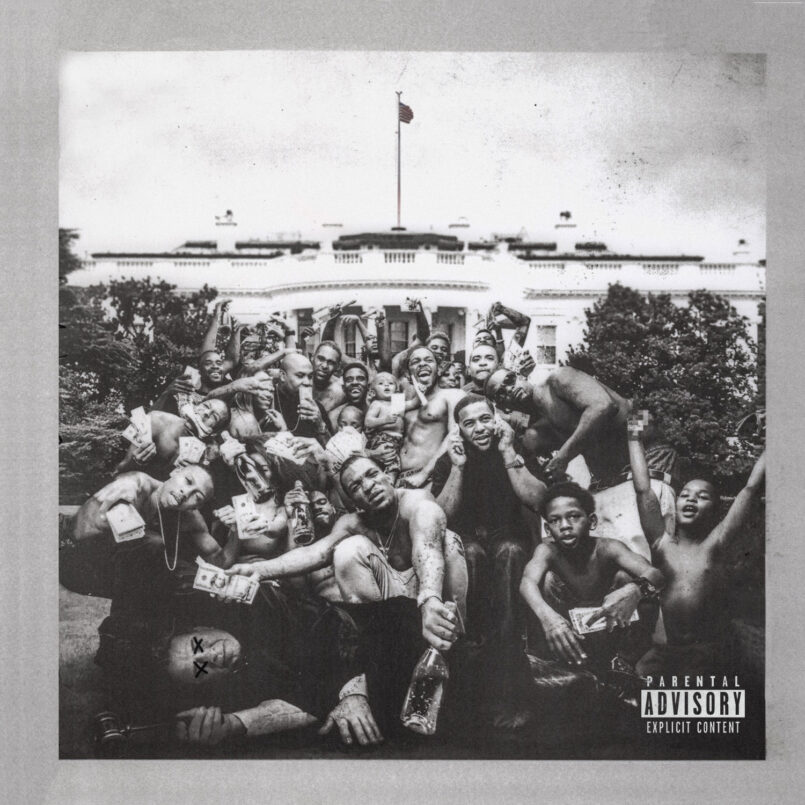1. Kendrick Lamar — To Pimp a Butterfly (TOP DAWG/AFTERMATH/INTERSCOPE)
When Flying Lotus released “Never Catch Me” last October, we didn’t know that To Pimp a Butterfly existed. We didn’t know that it would yield a single whose chorus would become a protest chant. We didn’t know that that song would prompt Geraldo Rivera to label hip hop more corrosive to black culture than racism. We didn’t know that the album would open the door so wide that one of its backing musicians would be able to release a triple-stack jazz LP into the critical mainstream. What we knew was that the mighty Flying Lotus had put together one of his most challenging tracks—with a ribbonesque bass solo from Thundercat, no less—and that Kendrick Lamar drove it like he stole it.
That’s no small thing. Kendrick’s gravity-defying 2012 LP, good kid, m.A.A.d city, showcased his talents as a storyteller and satirist, not to mention his ability to transform even the wooziest and most somnambulant of beats into pure vitality. But To Pimp a Butterfly, which dropped with little warning on the Ides of March, is something else entirely. For one, he sounds like he’s having way more fun. Make no mistake, this album is heavy with mourning, frustration, and anger, but Kendrick wears all of that darkness as though he’s already come through it. It’s the full-length fulfillment of “Never Catch Me”’s four-minute promise.
That might be a function of Kendrick’s having nothing left to prove, but it might also be related to the album’s central theme, delivered point blank in the opening lines of “Alright”: “I’m fucked up, homie, you’re fucked up, but if God got us, then we gon be alright.” There’s a hope—ever more confounding in 2015, when everything seems to suggest otherwise—that the divine being not only sees oppression but acts to bring the oppressed to the other side. Coming just a few months after the criminal justice system failed to exercise its God-given duty to prosecute the police officer accused of murdering Eric Garner, and finding its footing in a year that’s seen our political discourse go from ugly to beyond the pale, such hope feels foolish, but Lamar, like any good prophet, makes it admirable.
Of course, if all Kendrick had was his message, we wouldn’t be here. What helps To Pimp a Butterfly to transcend—but not abandon—its protest origins is that aforementioned sense of joy: he’s mad, but he ain’t stressed. Kendrick gleefully explores the topography of his beats, which come courtesy of everyone from Pharrell (“Alright”) to Boi-1da (“The Blacker the Berry”) to Thundercat and FlyLo themselves (“Wesley’s Theory”). Terrace Martin wrangles Kamasi Washington’s sax-led big band into a sizzling freeform in “For Free? (Interlude),” then he churns out the thickest groove of the year in “King Kunta,” the very next track. On the latter, Kendrick spins a goofy you-ain’t-shit taunt into a heady criticism of the past hundred and fifty years of US race relations with a flick of the verbal wrist and sounds like he’s enjoying the hell out of the whole thing. On the latter, well—if Donald Trump knew that braggadocio works better when it’s couched in self-awareness, the world might look a little different right now.
It’s been a long time since a record that had this much to say about the world said it this well. It’s got a bone to pick. It loves itself. It’s protest music that’s being played in the White House. And in a year that’s gotten uglier the longer it’s gone on, that in itself is almost reason enough to believe. FL
Click here to see the rest of our picks for Best Music of 2015.








